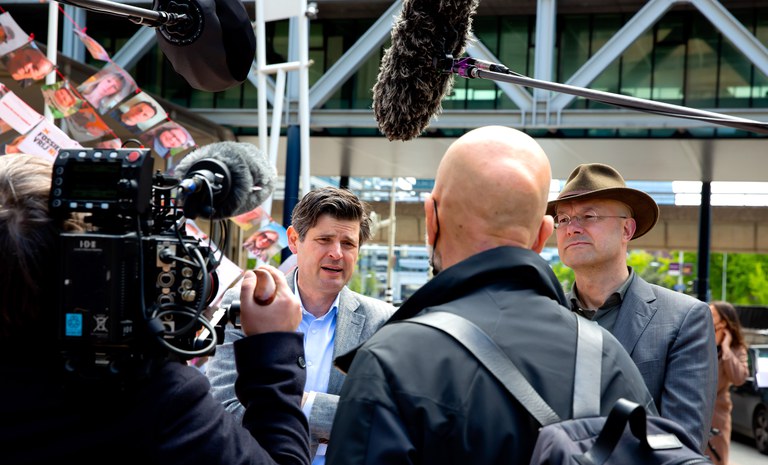Almost everyone has by now written something about our Climate Case. TV programs have spent hours of airtime on it. This has, however, resulted in a lot of inaccuracies being thrown out into the world. Here we list the major inaccuracies for you and explain what’s really going on.
The duty of the judge was to examine whether Shell’s policy is at odds with the ‘unwritten standard of due care’. After all, a multinational like Shell must also comply with the law of the land. We believe, however, that the government could have averted this entire case had it simply drafted better laws that multinationals would have to comply with. "
Our director, Donald Pols, on May 26, chose to focus on the politics of the case: ‘Milieudefensie is also looking at the politics of the day, both in the Netherlands and in Europe. Read the verdict carefully and use it to your advantage. Involve all of the big companies to help prevent disastrous climate change. Lawsuits should not be necessary to protect a nation’s citizens. But we will continue on this path until everyone is doing their part and climate change is no longer the greatest concern for the future’.
This statement is simply incorrect. Research shows that a move towards sustainability creates more jobs than are lost. Recent research by the International Energy Agency shows that around 5 million jobs will be lost in the fossil fuel industry in the coming years. but this will be offset by the creation of about 30 million green jobs.
It is now up to Shell. Does the company opt for a green future and become a sustainable employer, or not? Shell can play a pioneering role here. It is clear that drilling for oil and gas has no future. Shell could be the first fossil fuel company to say goodbye to polluting fuels for good. And it could then become the largest renewable energy company in the world.
The judge ruled that the future of the planet outweighs any setbacks that Shell may encounter as a result of this verdict.
Former Shell CEO, Peter Voser, on the television program Buitenhof, emphasised that: ‘Shell is being discriminated against and that’s not fair’. But just because yours is the first company to be accused of violating human rights, is that really unfair or a case of discrimination? The reality is, of course, that Shell should have taken the initiative and intervened much sooner. Shell has known for years about the devastating effects of its own actions and inactions, but decided to do nothing.
This is simply the way the judicial system works. The court always focuses on individual lawsuits, and not on general cases. The court cannot hand down rulings on other companies not named in the lawsuit, because we have not (yet) sued these other companies.

In the courtroom, Shell claimed that were it to leave Nigeria, for example, other companies would simply step in and fill the gap. Thus implying that this would have no verifiable effect on CO2 emissions. The judge disagreed. Other companies all have the same responsibilities as Shell. They are also required to reduce their CO2 emissions. For example, a company like BP has already indicated that it is going to stop investing in new oil and gas wells. Simply because oil and gas will no longer be profitable in the future.
It is indeed true that only governments signed the Paris Agreement on climate. Nevertheless, the court ruled that companies are themselves also responsible for preventing disastrous climate change. This is regardless of what individual nations do. Shell’s emissions are much greater than those of many countries, including the Netherlands. In 2019, Shell was the source of a total of 1.63 billion tons of CO2 emissions. This is nearly 9 times more than the total for the entire Netherlands. The judge also established that, because of its size, Shell has a great deal of influence in turning the tide. It urgently needs to work with the public, for example, to increase society’s sustainability levels.
Shell is not above the law. Although it sometimes thinks otherwise. Shell will have to comply with the judge’s decision. If Shell refuses, there will be consequences. For example, in the form of a penalty. In any case, Shell can expect considerable reputational damage if it fails to comply with the judge’s verdict. Shell CEO Ben van Beurden stated on LinkedIn that Shell is taking the verdict seriously but will have to step up its response. We will, of course, keep a close eye on whether this actually comes to pass.

This is precisely what Shell always says. But consumers are not necessarily demanding more oil and gas. Consumers merely want a plan that will ensure a way to heat their homes and a way to get from point A to point B. A way that is also sustainable!
Moreover, consumers do not have the same amount of influence as Shell. Shell has the knowledge, the money and the lobbying power to make a real difference. Shell is therefore ideally positioned to use its influence to enable consumers to make more sustainable choices.
The court decided that Shell should stop being a follower, and start leading the way. The judge also decreed that everyone has their own responsibilities in the climate crisis: consumers, the government and companies, which, of course, also includes Shell.
We can only conduct activities like this because so many people support us financially. The Climate Case against Shell has been fully funded by people like you. People who want to solve the issue of global warming earth from warming up even more. Do you want to support our sustainability efforts? Then become a member of Milieudefensie.
Our website uses cookies to ensure the use and functionality of this website. Read more about our cookie policy